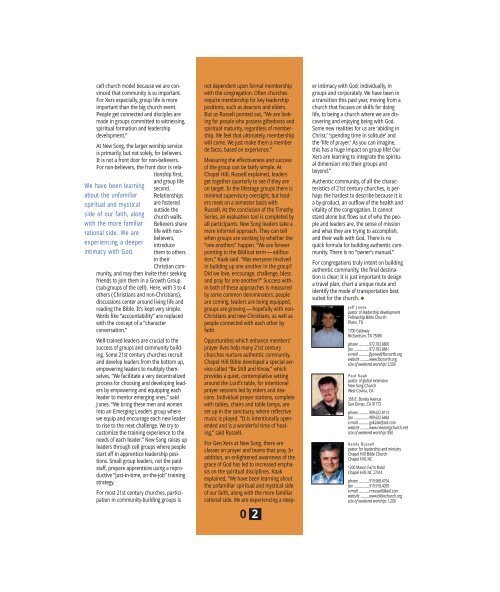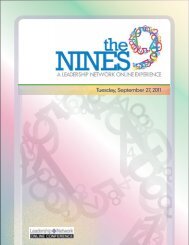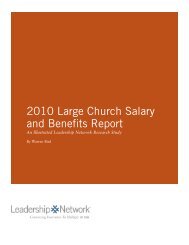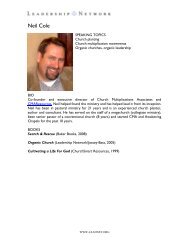ARE WE A PEOPLE AT HALF TIME? - Leadership Network
ARE WE A PEOPLE AT HALF TIME? - Leadership Network
ARE WE A PEOPLE AT HALF TIME? - Leadership Network
You also want an ePaper? Increase the reach of your titles
YUMPU automatically turns print PDFs into web optimized ePapers that Google loves.
cell church model because we are convinced<br />
that community is so important.<br />
For Xers especially, group life is more<br />
important than the big church event.<br />
People get connected and disciples are<br />
made in groups committed to witnessing,<br />
spiritual formation and leadership<br />
development.”<br />
At New Song, the larger worship service<br />
is primarily, but not solely, for believers.<br />
It is not a front door for non-believers.<br />
For non-believers, the front door is relationship<br />
first,<br />
and group life<br />
We have been learning second.<br />
about the unfamiliar Relationships<br />
spiritual and mystical are fostered<br />
outside the<br />
side of our faith, along church walls.<br />
with the more familiar Believers share<br />
rational side. We are life with nonbelievers,<br />
experiencing a deeper introduce<br />
intimacy with God. them to others<br />
in their<br />
Christian community,<br />
and may then invite their seeking<br />
friends to join them in a Growth Group<br />
(sub-groups of the cell). Here, with 3 to 4<br />
others (Christians and non-Christians),<br />
discussions center around living life and<br />
reading the Bible. It’s kept very simple.<br />
Words like “accountability” are replaced<br />
with the concept of a “character<br />
conversation.”<br />
Well-trained leaders are crucial to the<br />
success of groups and community building.<br />
Some 21st century churches recruit<br />
and develop leaders from the bottom up,<br />
empowering leaders to multiply themselves.<br />
“We facilitate a very decentralized<br />
process for choosing and developing leaders<br />
by empowering and equipping each<br />
leader to mentor emerging ones,” said<br />
Jones. “We bring these men and women<br />
into an Emerging Leaders group where<br />
we equip and encourage each new leader<br />
to rise to the next challenge. We try to<br />
customize the training experience to the<br />
needs of each leader.” New Song raises up<br />
leaders through cell groups where people<br />
start off in apprentice leadership positions.<br />
Small group leaders, not the paid<br />
staff, prepare apprentices using a reproductive<br />
“just-in-time, on-the-job” training<br />
strategy.<br />
For most 21st century churches, participation<br />
in community-building groups is<br />
0 2<br />
not dependent upon formal membership<br />
with the congregation. Often churches<br />
require membership for key leadership<br />
positions, such as deacons and elders.<br />
But as Russell pointed out, “We are looking<br />
for people who possess giftedness and<br />
spiritual maturity, regardless of membership.<br />
We feel that ultimately, membership<br />
will come. We just make them a member<br />
de facto, based on experience.”<br />
Measuring the effectiveness and success<br />
of the group can be fairly simple. At<br />
Chapel Hill, Russell explained, leaders<br />
get together quarterly to see if they are<br />
on target. In the lifestage groups there is<br />
minimal supervisory oversight, but leaders<br />
meet on a semester basis with<br />
Russell. At the conclusion of the Timothy<br />
Series, an evaluation tool is completed by<br />
all participants. New Song leaders take a<br />
more informal approach. They can tell<br />
when groups are working by whether the<br />
“one anothers” happen. “We are forever<br />
pointing to the Biblical term— edification,”<br />
Kaak said. “Was everyone involved<br />
in building up one another in the group<br />
Did we love, encourage, challenge, bless<br />
and pray for one another” Success within<br />
both of these approaches is measured<br />
by some common denominators: people<br />
are coming, leaders are being equipped,<br />
groups are growing— hopefully with non-<br />
Christians and new Christians, as well as<br />
people connected with each other by<br />
faith.<br />
Opportunities which enhance members’<br />
prayer lives help many 21st century<br />
churches nurture authentic community.<br />
Chapel Hill Bible developed a special service<br />
called “Be Still and Know,” which<br />
provides a quiet, contemplative setting<br />
around the Lord’s table, for intentional<br />
prayer sessions led by elders and deacons.<br />
Individual prayer stations, complete<br />
with tables, chairs and table lamps, are<br />
set up in the sanctuary, where reflective<br />
music is played. “It is intentionally openended<br />
and is a wonderful time of healing,”<br />
said Russell.<br />
For Gen Xers at New Song, there are<br />
classes on prayer and teams that pray. In<br />
addition, an enlightened awareness of the<br />
grace of God has led to increased emphasis<br />
on the spiritual disciplines. Kaak<br />
explained, “We have been learning about<br />
the unfamiliar spiritual and mystical side<br />
of our faith, along with the more familiar<br />
rational side. We are experiencing a deeper<br />
intimacy with God; individually, in<br />
groups and corporately. We have been in<br />
a transition this past year, moving from a<br />
church that focuses on skills for doing<br />
life, to being a church where we are discovering<br />
and enjoying being with God.<br />
Some new realities for us are ‘abiding in<br />
Christ,’ ‘spending time in solitude’ and<br />
the ‘life of prayer.’ As you can imagine,<br />
this has a huge impact on group life! Our<br />
Xers are learning to integrate the spiritual<br />
dimension into their groups and<br />
beyond.”<br />
Authentic community, of all the characteristics<br />
of 21st century churches, is perhaps<br />
the hardest to describe because it is<br />
a by-product, an outflow of the health and<br />
vitality of the congregation. It cannot<br />
stand alone but flows out of who the people<br />
and leaders are, the sense of mission<br />
and what they are trying to accomplish,<br />
and their walk with God. There is no<br />
quick formula for building authentic community.<br />
There is no “owner’s manual.”<br />
For congregations truly intent on building<br />
authentic community, the final destination<br />
is clear; it is just important to design<br />
a travel plan, chart a unique route and<br />
identify the mode of transportation best<br />
suited for the church. ◆<br />
Jeff Jones<br />
pastor of leadership development<br />
Fellowship Bible Church<br />
Plano, TX<br />
1700 Gateway<br />
Richardson, TX 75080<br />
phone ............972.783.8800<br />
fax .................972.783.8841<br />
e-mail ............jljones@fbcnorth.org<br />
website ..........www.fbcnorth.org<br />
size of weekend worship: 3,500<br />
Paul Kaak<br />
pastor of global extension<br />
New Song Church<br />
West Covina, CA<br />
358 E. Bonita Avenue<br />
San Dimas, CA 91773<br />
phone ............909.622.8113<br />
fax .................909.622.6484<br />
e-mail ............gok2ak@aol.com<br />
website ..........www.newsongchurch.net<br />
size of weekend worship: 850<br />
Randy Russell<br />
pastor for leadership and ministry<br />
Chapel Hill Bible Church<br />
Chapel Hill, NC<br />
1200 Mason Farm Road<br />
Chapel Hill, NC 27514<br />
phone ............919.968.4754<br />
fax .................919.918.4059<br />
e-mail ............rnrussell@aol.com<br />
website ..........www.biblechurch.org<br />
size of weekend worship: 1,200







